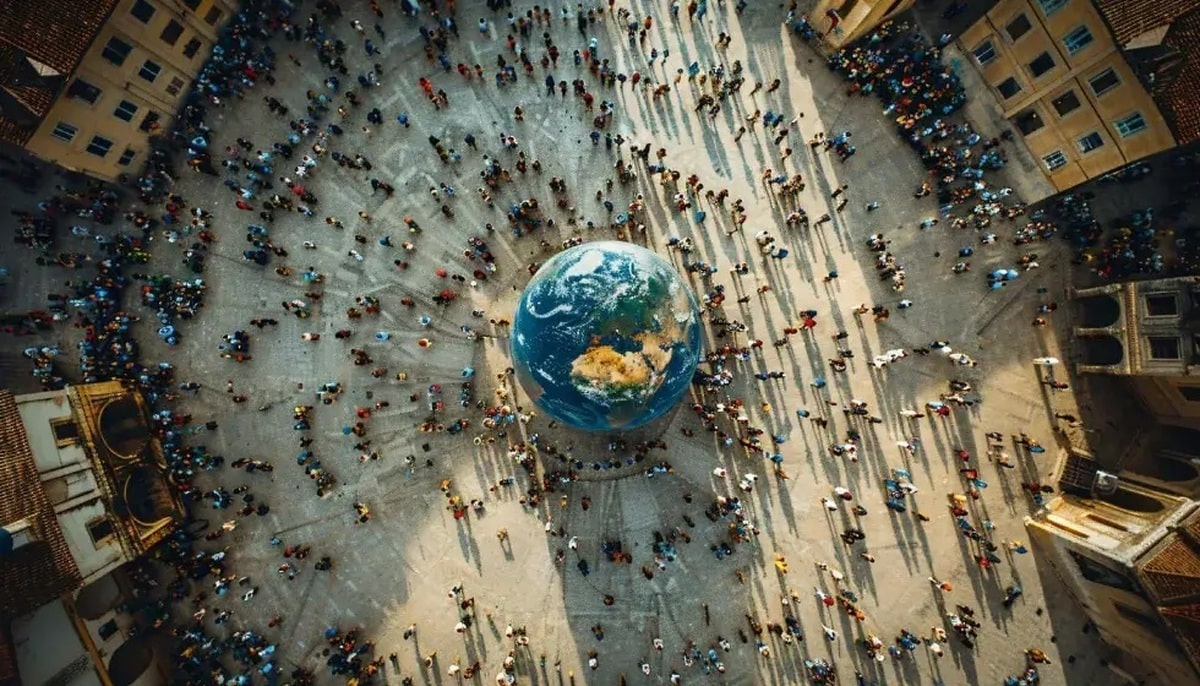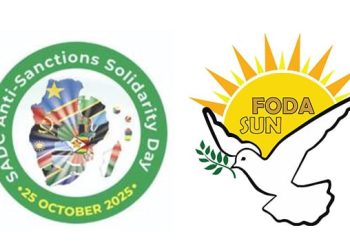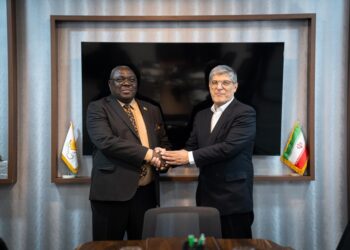Establishing a democratic and equitable international order is a multifaceted and extensive endeavor that demands concerted efforts at various levels. Key approaches to foster such an order include:
Strengthening international institutions and fostering cooperation:
- Enhancing the United Nations and its affiliated organizations.
- Establishing and reinforcing international courts to address crimes against humanity.
Upholding commitment to international laws and norms:
- Encouraging nations to adhere to international human rights treaties.
- Promoting respect for the rule of law on the global stage.
Promoting economic and social development:
- Facilitating greater economic and political cooperation between nations.
- Addressing global poverty and inequality.
- Ensuring equal opportunities for all individuals worldwide.
Advancing technological and communication development:
- Facilitating the exchange of democratic experiences among nations.
- Expanding access to global information and communication platforms (Best Diplomats, 2023, https://shorturl.at/YkBPg).
Realizing a democratic and equitable international order necessitates sustained collaboration and cooperation among all nations, international organizations, and civil societies. Although this process may encounter challenges and obstacles, unwavering commitment, and perseverance can progressively advance toward a more equitable and democratic world. This article examines Tehran’s crucial initiatives in international forums aimed at fostering a democratic and equitable international order. These initiatives encompass active participation in international forums, hosting international conferences and meetings, emphasis on establishing regional and international alliances, Anti-Colonial stances in international forums, and development of science and technology and participation in scientific forums.
Active Participation in International Forums
Senior Iranian officials, including the President and Minister of Foreign Affairs, actively participate in international forums. One of the most significant platforms Iran utilizes to articulate its viewpoints is the United Nations General Assembly. The annual speeches delivered by Iranian presidents during this assembly consistently garner significant attention.
During these speeches, Iranian officials often emphasize several crucial issues:
- The necessity for international structure reform, particularly regarding the UN Security Council.
- Criticism of unilateralism and the promotion of multilateralism in international relations.
- Support for the rights of developing countries and condemnation of global economic inequalities.
- Defense of Iran’s right to pursue peaceful nuclear technology.
- Critique of the policies of the US and its allies in the West Asian region (UN News, 2023, https://shorturl.at/Q75nG)
Aside from the United Nations, Iran actively engages in other international forums. These include organizations such as the Non-Aligned Movement, the Organization of Islamic Cooperation, and more recently, the Shanghai Cooperation Organization and BRICS. In these forums, Iran endeavors to find allies for its viewpoints and emphasizes the importance of cooperation among developing nations. Participating in these forums provides Iran with the opportunity to directly present its perspectives to the global community and engage with other countries. This presence also enables Iran to position itself as a significant and responsible player on the international stage.
Hosting International Conferences and Meetings
Iran frequently serves as a host for international conferences and meetings centered around topics related to global affairs. These gatherings offer Iran a valuable platform to express its perspectives in a distinguished setting and engage with intellectuals, politicians, and activists from across the globe. Among these events, the International Conference in Support of the Palestinian Intifada stands out as one of the most significant, regularly taking place in Tehran (president, 2020, https://shorturl.at/00n8P). This conference serves as an occasion for Iran to voice its stance on the Palestinian matter and regional dynamics, thus demonstrating its unwavering support for Palestinian resistance.
Iran has also organized conferences on a range of subjects, including counterterrorism, human rights from an Islamic standpoint, and regional economic cooperation (Newyork Mfa, 2023, https://shorturl.at/bSJxX). Typically, these events draw attendees from various countries, particularly those in the developing world and nations that share close ties with Iran.
The objectives behind hosting these conferences are manifold:
- Presenting Iran’s perspectives on critical global and regional issues
- Establishing a network of allies and like-minded individuals on the international stage
- Garnering attention from global media outlets for Iran’s positions
- Demonstrating Iran’s capacity to host significant international events
Furthermore, these gatherings enable Iran to position itself as a key hub for dialogue and the exchange of ideas concerning global matters.
Emphasis on Establishing Regional and International Alliances
Iran places significant emphasis on fostering cooperation and solidarity among developing nations. This approach is a crucial aspect of Iran’s endeavors to create strategic alliances and counter the influence wielded by Western powers.
Illustrative examples of this approach include:
Relations with Venezuela: Iran has cultivated strong ties with Venezuela, particularly during the tenures of Hugo Chavez and Nicolas Maduro. This collaboration encompasses joint ventures in oil, industry, and housing. Notably, in 2020, Iran dispatched tankers to Venezuela to alleviate fuel shortages, showcasing a practical demonstration of solidarity (Al Jazeera, 2020, https://shorturl.at/S3VT5).
Cooperation with Cuba: Iran and Cuba enjoy close bilateral relations and engage in collaboration across various domains, including biotechnology. Amidst the COVID-19 pandemic, both nations collaborated in vaccine production efforts (Iranpress, 2023, https://shorturl.at/7Q5GQ).
Relations with Africa: Iran has actively sought to broaden its relations with African countries. For instance, Iran has invested in infrastructure projects in nations such as Senegal and Sudan (Cambridge University Press & Assessment, 2024, https://shorturl.at/GSv4R).
Membership in international organizations: Iran actively participates as a member of the Non-Aligned Movement and recently attained full membership in the Shanghai Cooperation Organization. These affiliations afford Iran enhanced opportunities for closer cooperation with developing nations (Atlantic Council, 2023, https://cl.gy/MHqEc).
Anti-Colonial Stances in International Forums
Iran has consistently maintained anti-colonial stances, deeply rooted in its historical experiences with colonial powers during the 19th and 20th centuries. In the contemporary era, particularly after the 1979 Islamic Revolution, these positions have become fundamental principles of Iran’s foreign policy. Iran consistently advocates for the independence of nations and resistance against the dominance of major powers. The country consistently voices opposition to colonial and neo-colonial policies in international forums, including the United Nations, while calling for an end to the economic and political control exerted by powerful nations over developing countries.
Iran’s anti-colonial stances encompass criticisms of military interventions by major powers in other nations, rejection of unilateral economic sanctions, and support for countries’ sovereign rights to exploit their natural resources. Additionally, Iran supports independence movements across various regions worldwide. These stances have occasionally strained Iran’s relations with certain Western powers. Conversely, this approach has brought Iran closer to certain developing countries and the Non-Aligned Movement (Yale Journal of International Law, 2023, https://shorturl.at/0gpVm). Iran seeks to forge strategic alliances with countries that share similar perspectives by leveraging these stances.
In summary, anti-colonial stances constitute a key element of Iran’s foreign policy discourse, significantly impacting the country’s relations with the international community and its role on the global stage. An assessment of these stances reveals their influence on fostering a democratic and equitable international order.
Development of Science and Technology and Participation in Scientific Forums
Emergence as a Scientific and Technological Hub
Iran has made substantial investments in the advancement of science and technology in recent years. Despite economic sanctions and international restrictions, the country has strived for self-sufficiency in scientific and technological domains. Notably, Iran has achieved remarkable progress in areas such as nanotechnology, biotechnology, nuclear sciences, and information technology. This development has not only improved the country’s economic and social landscape but has also positioned Iran as a prominent player in the global science and technology arena.
To bolster its scientific and technological foundations, Iran has implemented policies that foster innovation and scientific entrepreneurship. These policies encompass the establishment of technology parks, support for startups, and enhanced access to financial and infrastructural resources for scientific entrepreneurs. Through these initiatives, Iran aims to become a hub of scientific and technological excellence in the region while fortifying its international standing (Austria.mfa.gov, 2024, https://shorturl.at/g0zKj). This trajectory contributes to the realization of a democratic and equitable international order.
Strengthening Scientific Diplomacy
Iran is actively pursuing scientific diplomacy as a means to enhance international relations. Tehran aims to use science and technology to foster knowledge and technology exchange with other countries by sending researchers and scientists to international universities and research centers. Additionally, Iran is promoting long-term scientific cooperation by inviting foreign scientists to participate in joint scientific projects (Cistc, 2024, https://cistc.ir/en/ihit/china). This approach to scientific diplomacy has the potential to bolster Iran’s standing in the global community and establish a more equitable scientific order.
Iran is also focused on developing specialized and knowledge-based human resources by increasing the number of universities, establishing advanced research centers, and offering diverse and up-to-date educational programs. These initiatives enable Iran to progress in global scientific endeavors and play a more influential role in international cooperation.
Furthermore, Iran places particular emphasis on scientific collaboration with developing countries and those in the Global South. These collaborations involve student exchanges, joint research projects, and technology transfers. Through these partnerships, Iran aims to reduce global disparities in scientific and technological capabilities and foster a more equitable scientific order.
Participation in International Scientific Summits and Conferences
Iran actively engages in international scientific and research projects to expand its contribution to global scientific advancements. These collaborations encompass various scientific fields such as renewable energies, medicine, and the environment. By participating in these initiatives, Iran not only enhances its scientific standing but also addresses global challenges like climate change and infectious diseases. This contributes to the establishment of a democratic and equitable international order (Iranpress, 2023, https://shorturl.at/7Q5GQ).
Iran’s active involvement in international scientific summits and conferences is geared towards fostering scientific interactions with other countries and gaining a more prominent position on the world scientific stage. By participating in these forums, Iran has the opportunity to showcase its scientific achievements, learn from the experiences and knowledge of other nations, and participate in international research projects. These engagements strengthen Iran’s scientific capabilities and facilitate international cooperation in scientific fields.
- UN News (2023), Iranian President denounces West’s meddling in affairs of Middle East countries, Accessible at: https://shorturl.at/Q75nG
- President (2020), The 6th International Conference in Support of the Palestinian Intifada, Accessible at: https://shorturl.at/00n8P
- Newyork Mfa (2023), Statement on Measures to Eliminate International Terrorism, Accessible at: https://shorturl.at/bSJxX
- Al Jazeera (2020), Iran sends biggest ever fleet of oil tankers to Venezuela, Accessible at: https://shorturl.at/S3VT5
- Iranpress (2023), Iran, Cuba to produce new vaccines, Accessible at: https://shorturl.at/7Q5GQ
- Cambridge University Press & Assessment (2024), Iran and Senegal, Accessible at: https://shorturl.at/GSv4R
- Best Diplomats (2023), The Concept of Public Diplomacy In the 21st Century, Accessible at: https://shorturl.at/YkBPg
- Yale Journal of International Law (2023), The Brutal Impact of Sanctions on the Global South, Accessible at: https://shorturl.at/0gpVm
- mfa.gov (2024), Science, Technology and Innovation in Iran: A Brief Review, Accessible at: https://shorturl.at/g0zKj
- Cistc (2024), Iran Innovation and Technology House in China, Accessible at: https://cistc.ir/en/ihit/china/





